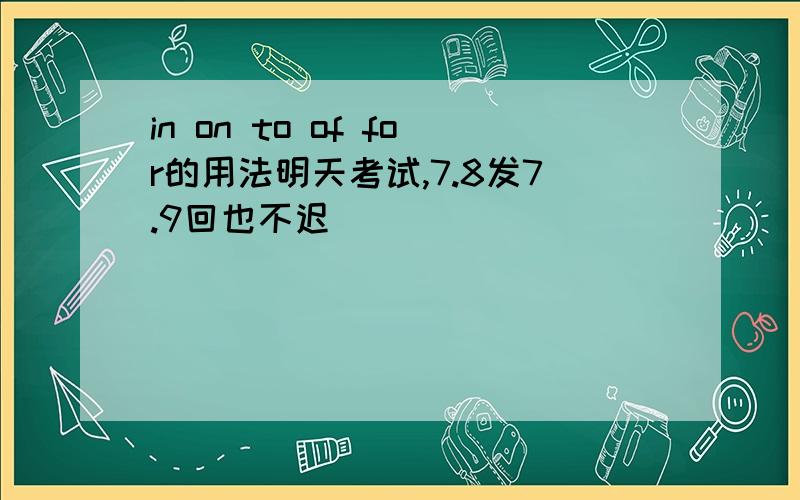in on to of for的用法明天考试,7.8发7.9回也不迟
来源:学生作业帮助网 编辑:作业帮 时间:2024/11/30 11:03:31

in on to of for的用法明天考试,7.8发7.9回也不迟
in on to of for的用法
明天考试,7.8发7.9回也不迟
in on to of for的用法明天考试,7.8发7.9回也不迟
介词用法大全如下,你慢慢研究吧
⑴ 时间或地点介词in、on、at的用法区别:表示时间时, in表示在一段时间里(在将来时句子中则表示在一段时间之后),
on表示在具体的某一天或者某天的上下午等, at表示在某个时刻或者瞬间;表示地点时, in表示在某个范围之内,
on表示在某个平面上或与一个面相接触,at则表示在某个具体的场所或地点.如:He was born on the morning of May
10th.(他出生于五月十日的早晨)/ I usually get up at 7:00 in the morning.(我通常在早上的七点钟起床) / His
glasses are right on his nose.(他的眼镜就架在他的鼻子上)/ He is at the cinema at the
moment.(此刻他正在电影院)
⑵ after与in表示时间的用法区别:“after+(具体时刻/从句)”表示“在…时刻之后”常用于一般时态;“in+(一段时间)”表示“在(多久)
之后”,常用于将来时态.如:He said that he would be here after 6:00.(他说他六点钟之后会来这儿)/ My father
is coming back from England in about a month.(我父亲大约一个月以后从英国回来)
⑶
since与for表示时间的用法区别:“since+(具体时刻/that-从句)”表示“自从…起一直到现在”,“for
+(一段斶间)”表示“总共有…之久”,都常用于完成时态;如:Uncle Li has worked in this factory since
1970.(李叔叔自从1970年起就在这家工厂工作了)/ Uncle Li has worked in this factory for over 30
years. (李叔叔在这家工厂已经工作了30多年)
⑷
by、in与with表示方式的用法区别:都可以表示“工具、手段”,但是by主要表示“乘坐”某个交通工具或“以……方式”,在被动句中可以表示动作的执行者;in表示“使用”某种语言/文字,with表示“使用”某个具体的工具、手段.如:We
see with our eyes and walk with our feet.(我们用眼睛看东西,用双脚走路)/ Please write that
article(文章) in English.(请你用英语写那篇文章)/ Let’s go to the zoo by taxi.(我们打的去动物园吧.)/
It was written by Lao She.(那是老舍写的)
⑸
about与on的用法区别:都可以表示“有关…”,但是about的意义比较广,而on主要表示“有关…(专题/课程)”.如:Tom is going to
give a talk on the history of America.(汤姆要作一个美国历史的报告)/ They are very excited
talking about the coming field trip.(他们兴致勃勃地谈论着即将来到的野外旅游)
⑹ through与across、over的用法区别:
through指“穿过…(门洞/人群/树林)”; across和over可以指“跨越…(街道/河流)”,可互换,但是表示“翻过…”时只能用over.
如:Just then a rat (鼠)ran across the road.(就在那时一只老鼠跑过路面)/ There is a bridge
across/over the river.(河上有座桥)/ They climbed over the mountain and arrived there
ahead of time.(他们翻过大山提前到达了那里)/ The visitors went through a big gate into another
park.(参观者们穿过一个大门来到另一个公园)
(7)as与like的区别:两个词都表示“像……”,但是as译为“作为……”,表示的是职业、职务、作用等事实,而like译为“像……一样”,表示外表,不是事实.如:Let
me speak to you as a father.(我以父亲的身份和你讲话.)(说话者是听者的父亲) / Let me speak to you like
a father.(让我像一位父亲一样和你讲话)(说话者不是听者的父亲)
(8)at the end of、by the end of、to the end、in the end的用法区别:at
the end of…既可以表示时间也可以表示地点,译为“在…末;在…尽头”,常与过去时连用;by the end
of…只能表示时间,译为“在…前;到…为止”,常用于过去完成时; in the end与at last基本等义,表示“终于、最后”,通常用于过去时;to the
end译为“到…的终点为止”,前面往往有表示运动或连续性的动词.如:By the end of last term we had learned 16
units of Book III.(到上学期期末我们已经学习了第三册16个单元)/ At the end of the road you can find a
big white house with brown windows.(在路的尽头你能找到一幢有棕色窗户的白房子)/ They left for Beijing
at the end of last week.(上周末他们动身去了北京)/ In the end he succeeded in the final
exams.(他最终在期末考试中考及格了)/ We should go on with the work to the end.(我们应该把工作干到底)/
Follow this road to the end and you will see a post office.(沿这条路走到底就能看见一家邮电局)
(9)for a moment、for the moment、in a
moment、at the moment的区别:for a moment“一会儿、片刻”(=for a while),常与持续性动词连用;for the
moment“暂时、目前”,常用于现在时;in a moment“一会儿、立即、马上”(=soon; in a few minutes),一般用于将来时;at
the moment“此刻,眼下”(=now),用于现在进行时.如:Please wait for a moment.(请稍等)/ Let’s leave
things as they are for the moment.(暂时就维持现状吧!) / I’ll come back in a
moment.(我过会儿回来)/ I am very busy at the moment.(眼下我很忙)
(10)but的问题:用介词but引出另一个动词时,要注意:如果前面有do,后面就用原形动词,前面没有do时,后面的动词要加to.如:I
could do nothing but wait.(我什么也做不了只能等) / They had no choice(选择) but to
fight.(他们没有选择只有战斗)
(11)in front of 与in
the front of: in front of“在…的前面”, 与in the front of“在…的前部”.如:A car was parking in
front of the hall.(大厅跟前停着一辆汽车)/ In the front of the hall stood a big
desk.(大厅前部立着一个大讲台)
(12)except
(for)与besides的区别:except“除了”,表示排除掉某人物,即不包含;而besides“除了”则表示包含,即“不仅……又……”.如:Everyone
went to the Palace Museum except Tom.(除了Tom,大家都去了故宫博物院)(Tom没有去故宫)/ Besides
Chinese he also studied many other subjects.(除了汉语之外,他还学其他许多功课)(“汉语”也是他学的功课之一)
other than 除了.之外. There 're nobody here other than me
与.不同. 与.不同方式.we can't get there other than by swimming.
Apart from : with the exception of ...; besides... Apart form a
few scratches, the car was undamaged.